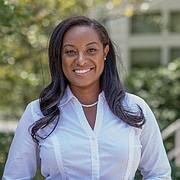Time to correct the disparities
4/23/2020, 6 p.m.
It’s no exaggeration to say that the COVID-19 pandemic has upended Virginians’ lives. We’re practicing new routines — like social distancing, obsessive hand washing, preparing kids for a day of remote learning and sewing masks — while grappling with difficult, new economic realities and the constant fear of becoming sick during a time when health care resources are limited.
In Virginia, the number of confirmed cases is rising each day, totaling 9,630 individuals out of 58,354 tested. In Delegate Carroll Foy’s Prince William County, there are 867 confirmed cases, the second highest in the Prince William Health District.
To put it mildly, this is a scary time here in Virginia and across the nation.
This unprecedented crisis poses a danger to the livelihood and well-being of nearly everyone. COVID-19 does not discriminate based on race, ethnicity, gender, age, education or socioeconomic status. And yet, all Virginians do not share the same risk of infection. The position of black and brown communities to combat this pandemic is weak, as evidenced by newly released mortality rates showing that predominantly black counties across the United States have triple the infections and six times as many deaths as predominantly white counties. It is also likely that these numbers are worse than they appear.
In Virginia, a remarkable 34.3 percent of all cases and hospitalizations did not include a report of race or ethnicity.
Access to testing, among other factors, remains a barrier. To put it bluntly, black Virginians are sick and dying at an alarming rate.
Disparities in black health outcomes are nothing new. For example, black women are three times more likely to die in childbirth and postpartum than other women. And African-Americans are more likely to live at younger ages with health issues that traditionally impact older people. What’s more, according to the Centers for Disease Control and Prevention, African-Americans are more likely to die younger from all causes. These unacceptable differences shed light on both the conscious and unconscious bias that plagues America’s health care systems.
Whether it’s maternal mortality rates or COVID-19, there are alarming inconsistencies in access, diagnosis and treatment. These prevent many black Virginians from getting the help they need.
Other determinants of health — environment, food accessibility, education and employment - also contribute to the problem and widen health disparities. African-Americans typically live in urban areas and closer to environmental hazard waste sites. Black families often house many generations in one dwelling, minimizing the opportunities to practice social distancing. We’re more likely to live in food deserts, where the most readily available meal may come from a gas station instead of the produce aisle. Black workers are far more likely to work front line, low-wage jobs. With only 1 in 5 black people being able to work from home, many others are facing furloughs and unemployment. These factors begin to describe why black Virginians are vulnerable to health issues, and why it’s difficult to properly care for our families if and when they get sick.
Due to our nation’s continued need for food, transportation and child care, many lowwage workers have found themselves in front line roles, placing themselves and their families at greater risk of exposure. When we do contract the virus, we are likely to face the same unequal access we’ve faced for centuries, also complicated by lack of paid sick days. Access to testing and treatment, better jobs and higher wages are not just health care or economic issues. They are social justice issues. Historically, and now more than ever, they are matters of life and death.
The time is now to make important changes. Private and public labs should be required to collect racial and ethnic data on the coronavirus testing, cases and hospitalizations so we better understand how we can improve resources and care for all Americans, including those typically left voiceless. Health care providers should release guidance on racial bias in health and health care systems specifically related to treatment of patients with COVID-19.
Gov. Ralph S. Northam should immediately sign the minimum wage increase to provide greater economic relief for hard-working families in this time of crisis. Finally, state and federal leaders must continue expanding access to health care and coordinating with local governments to provide personal protective equipment for all front line workers.
There’s much work to be done, but this is the time to be bold and act to correct the disparities that have plagued our systems for far too long. Hesitation in action will result in the tragic and ongoing loss of American lives.
The COVID-19 pandemic is a public health issue and a social justice issue. The time is now to address the inequalities that continue to stare us in the face. We have a responsibility to advocate for all Virginians and must take care not to fall into economic, health care and political traps that leave minority communities behind.
Delegate Carroll Foy represents the 2nd District in the House of Delegates that includes parts of Prince William and Stafford counties. Dr. Jones Webb is assistant professor of emergency medicine at the University of Virginia. Dr. Hilton-Buchholz is assistant professor of critical care at the University of Virginia.










